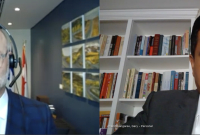The New Democratic Party concluded its caucus retreat on Friday, agreeing on several priorities for Indigenous Peoples, including housing, accountability for missing and murdered Indigenous women, girls, and two-spirited peoples (MMIWG2S+), and climate adaptation for Indigenous nations.
Canada’s National Observer caught up with Blake Desjarlais, MP for Edmonton Griesbach, and Lori Idlout, MP for Nunavut, two of the party’s three Indigenous caucus members. Both made time to discuss what the party will push for in its leveraged role within the Liberal-NDP deal that seeks to keep the current government in power until 2025.
Housing
The funding approved for Indigenous housing in last year’s budget wasn’t enough, Idlout said. The last budget allocated $60 million over two years for Nunavut, which Idlout called “a drop in the bucket,” adding community organizations aren’t getting the funding they need.
Idlout reiterates the need for $6 billion over two years to meet the urgent housing requirements of Indigenous Peoples.
“That’s something I need to keep sharing, that’s how bad the need is,” she said.
Idlout will be fighting for more housing resources, especially in her home territory of Nunavut.
Many of the houses in Nunavut are stick homes, built out of wood in a climate beyond the tree line, Desjarlais explained. Homes that were built in the 1960s, ’70s and ’80s are no longer surviving the northern climate, he said.
Urban housing needs are another priority for the caucus, as a large majority of Indigenous Peoples live in urban centres.
Desjarlais described Indigenous Peoples caught in the housing crisis as “living in immense housing poverty.”
“Whether on or off reserve, Indigenous Peoples have to live in housing conditions that are deplorable,” he said.
Desjarlais calls for an Indigenous-led housing strategy that includes urban Indigenous Peoples, who may be the first generation to have lived in a city and at times in impoverished conditions.
“We need to see billions of dollars invested, thousands of units built, publicly accessible, not-for-profit housing for Indigenous families to make sure they have access to a good home,” he said.
Indigenous-led public housing will provide culturally safe solutions to urban Indigenous Peoples in need. It’s urgent work for Desjarlais, particularly in the harsh winters of Edmonton.
“We’ve already lost four people because we couldn’t find housing for them.”
MMIWG2S+ accountability
For MMIWG2S+, Desjarlais points to the need for “tangible investments” to help major cities fund the community institutions and organizations that are already doing this work best, he said. He wants pilot programs and federal red tape to be removed so grassroots work can proceed unabated by Ottawa.
“This is a very critical emergency, and there is no doubt that it has the legacy of genocide written into it.”
Desjarlais said the calls to justice from the national MMIWG2S+ inquiry are among the most pressing priorities for the NDP caucus. The NDP is investigating how it can advocate for funding to implement the calls to justice ahead of the 2023 budget.
Climate resiliency
Desjarlais spoke to the importance of climate resiliency in First Nations, pointing to some communities that have been evacuated after annual floods hit harder in particular years. Last year alone, Peguis First Nation in Manitoba and Grassy Narrows and Kashechewan First Nations in Ontario saw hundreds of community members evacuated due to flooding.
“It’s predictable. They happen every single year and they’re only getting worse,” Desjarlais said.
The existing fund for climate resiliency on First Nations across Canada is $12 million. The amount was in the crosshairs of the auditor general, who found Canada spent more money responding to climate emergencies on First Nations than preventing them.
“Why has [Indigenous Services Minister Patty Hajdu] chronically underfunded Indigenous communities in climate resilience funding, and in particular, in climate adaptation?” Desjarlais asked.
Desjarlais sits on the public accounts committee, and he used that role to grill deputy minister of Indigenous Services Gina Wilson. Wilson told Desjarlais that she asked Hajdu to increase funding for climate resiliency on First Nations to $360 million.
Desjarlais will use his role to summon Hajdu to ask questions regarding funding anomalies for climate resiliency on First Nations.
“It’s going to be very interesting to me to see how this government responds in this budget to what has been an obvious failure by Indigenous Services,” he said.
Matteo Cimellaro / Canada’s National Observer / Local Journalism Initiative







Comments